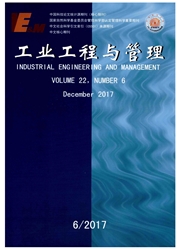

 中文摘要:
中文摘要:
随着低碳经济的发展,碳排放政策对于供应链的影响越来越受到关注。建立了基于系统动力学的单个供应商和销售商的供应链模型,并在此基础上引入强制排放和碳税两种碳排放政策。利用模型仿真,分析两种排放政策对于供应商、销售商及整个供应链的总成本和碳排放的影响。研究表明在强制排放模型中,不同的碳排放额度会使销售商选择不同的订货周期,发现合理的排放额度才能引导供应链双方降低排放,否则不仅达不到减排的目的,反而影响供应链效率;而在碳税模型中,提高碳税税率虽然会使政府获取一定的收益,但是实际上可能带来供应链总成本的上升和碳排放的增加,需要合理制定碳税税率引导绿色供应链发展。
 英文摘要:
英文摘要:
With the development of low carbon economy,people pay close attention to the effect of carbon emission to the supply chain.In this paper,we establish a supply chain model based on the system dynamics theory with single supplier and single retailer,and we analyze the impact of emission cap policy and carbon tax policy on the cost of the supplier,the retailer and the supply chain by simulation.We find that retailer chooses different optimal cycle under different emission allowances.Also,both the supplier and retailer have incentive to reduce the carbon emission only under a reasonable emission cap.Otherwise,it will hurt supply chain efficiency and cannot reach the purpose of emissions reduction;we also find that the cost of supply chain and the carbon emission will increase if the government increase emission tax rate too much in order to achieve more revenue.Therefore,the carbon tax rate should be formulated rationally rather than the higher the better to develop the green supply chain.
 同期刊论文项目
同期刊论文项目
 同项目期刊论文
同项目期刊论文
 Positive implications of market valuation under asymmetric quality information, DOI:10.1080/00207543
Positive implications of market valuation under asymmetric quality information, DOI:10.1080/00207543 Pricing and production quantity decisions in a supply chain with demand-stimulating service under de
Pricing and production quantity decisions in a supply chain with demand-stimulating service under de Contracting under asymmetric customer returns information and market valuation with advertising-depe
Contracting under asymmetric customer returns information and market valuation with advertising-depe 期刊信息
期刊信息
